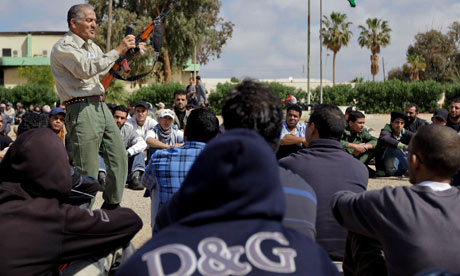Rebels without a corps: Benghazi's defenders strive to become an army
Libyan volunteers set up boot camp for revolutionaries – 'No one knows how to use their weapon. No discipline'

An instructor at the Benghazi rebel training camp shows new recruits how to use and maintain an AK47 assault rifle. Photograph: Ben Curtis/AP
Mareh Bejou was a pilot for Emirates when he flew in to Tripoli in mid-February. The next day he was a revolutionary who told his airline it had better send another pilot to take the plane back to Dubai.
Now Bejou, after his own crash course in fighting and surviving on the battlefield, is one of those in charge of a military training camp attempting to turn the volunteers of Benghazi into soldiers against Muammar Gaddafi
"I came to do my part in a peaceful demonstration but we were met with guns. For four days they were shooting at us, even using anti-aircraft guns. So I learned how to use a Kalashnikov and an RPG [rocket-propelled grenade] on the battlefield," said Bejou, who has been a pilot for 30 years. "I spent three weeks on the battlefield and it wasn't organised at all. No discipline. No one knew how to use their weapons. We set up this camp to change that."
At the training ground inside a former Gaddafi military base on the edge of Benghazi on Thursday more than 1,000 young men were gathered for instruction in the use of Kalashnikovs, mortars and rockets.
Some of the recruits put on a show of bravado. They claimed to be on the march to Tripoli to topple Gaddafi. But there was a more sober feeling among the bulk of volunteers, and the men showing them how to shoot, not flee.
A few weeks' training only goes so far against a more experienced and better disciplined force. The volunteers know that mostly they are at the camp to learn how to defend their homes if Gaddafi's troops make a push toward Benghazi.
Sadir Misrati took on the role of sergeant major, strutting around the parade ground barking at people. Short, with a bayonet stuck in his belt and 40 years of experience in Gaddafi's army to draw on, he acknowledged the challenge of trying to create soldiers in less than six weeks.
"They're volunteers and they don't know anything about this. They've never been in the military. They'll get a good idea of how to use their weapon. Maybe it's not enough but it gives them an idea," he said.
Just about everyone recognises that an idea is not enough to create an army that can bring down Gaddafi. On this point the men on the parade ground part ways with the western leaders who say they are equally keen to see Libya rid of its dictator.
Britain is hatching a plan to send experienced soldiers, such as former members of the SAS, to train the rebel army under the cover of private security companies paid for by Arab states. The revolutionary council's line on the prospect of foreign trainers is diplomatic.
"We will appreciate any friendly nation training our fighters," said Mustafa Gheriani, a council spokesman. "Our preference is for trainers of Arab origin but we appreciate the help from wherever it comes."
But at the training base there is suspicion.
"Why do they want to send trainers?" asked Bejou. "If they are talking about just a few weeks' training what's the point? We are doing that. If they are talking about long-term training they are talking about a long war and more people dying. That could turn this into a civil war. We don't want a long war. If Nato, the allies, want us to be in Tripoli we could be there in seven hours."
The talk of training for a longer war only fuels growing suspicion in Benghazi that Nato is abandoning the west's commitment to use air power to protect civilians. It was interpreted by the rebels as meaning western powers would destroy Gaddafi's army and clear the way for them to march into Tripoli.
Saleh Farej is the Kalashnikov instructor. Before he introduces himself he quickly says that his long white beard does not mean he is al-Qaida. It is not a joke. The rebels are disturbed by suggestions their uprising has been infiltrated by Islamist extremists. They fear it will cost them western support.
Farej says more training is not the problem. It is Nato they need. "If Nato is not with us we cannot win. Then we will be in the hands of God.
"But we will still want to be free so we will still fight to defend our city. My sons are on the frontline. I taught them here and they went to fight."

No comments:
Post a Comment